This is an Eval Central archive copy, find the original at freshspectrum.com.
I am a little stressed out.
In the US, voting in the general election has begun. My wife and I dropped our ballots off at the post office yesterday.
It’s not that I don’t think we have good shot of voting Trump out office, I think we do. But after the events of 4 years ago, I take nothing for granted.
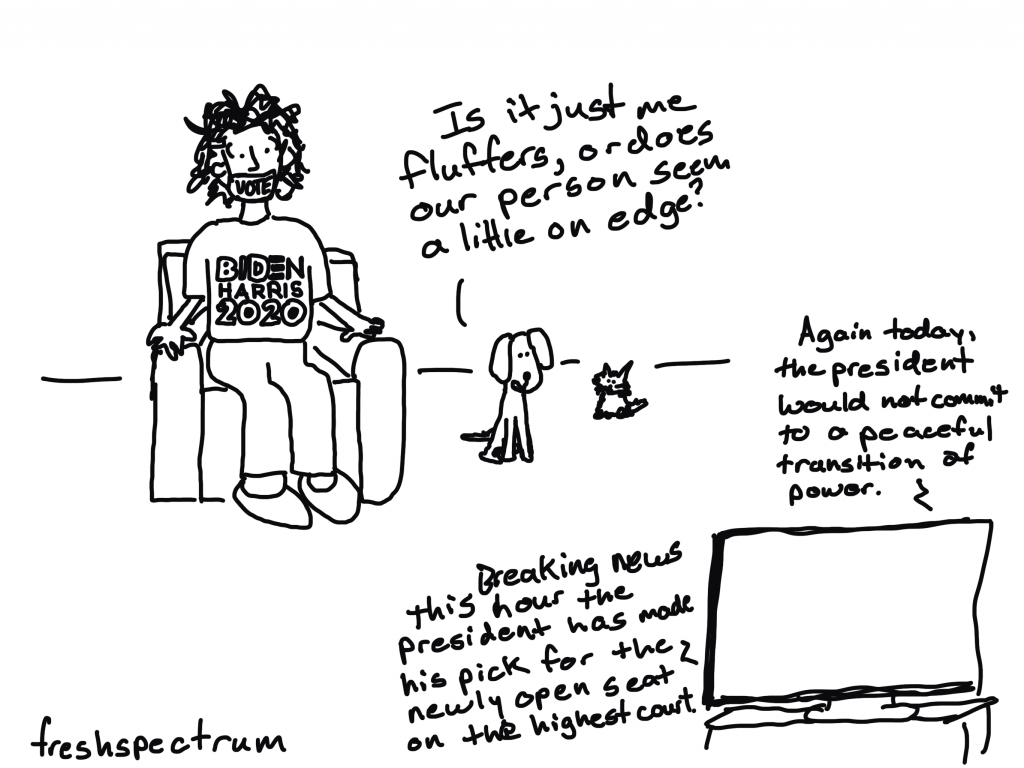
If you look at the national numbers, this election shouldn’t be particularly close. But unfortunately, that’s not how it works. While not the likely outcome, Trump still has the chance for an upset.
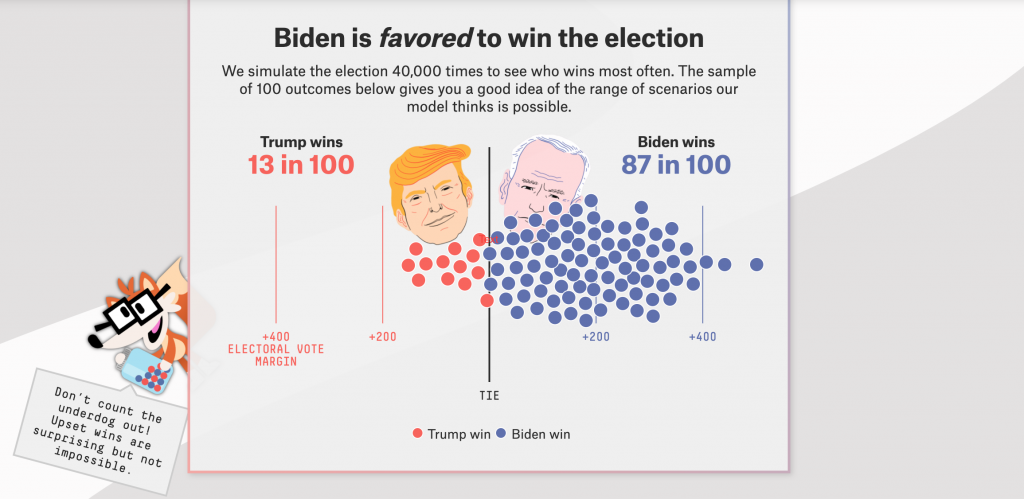
As a good number of you who follow my cartoons and receive this newsletter are not in the US, I thought I would provide a little bit of extra historical context. Cartoon Style.
The United States is a representative democracy that slants toward a republic.
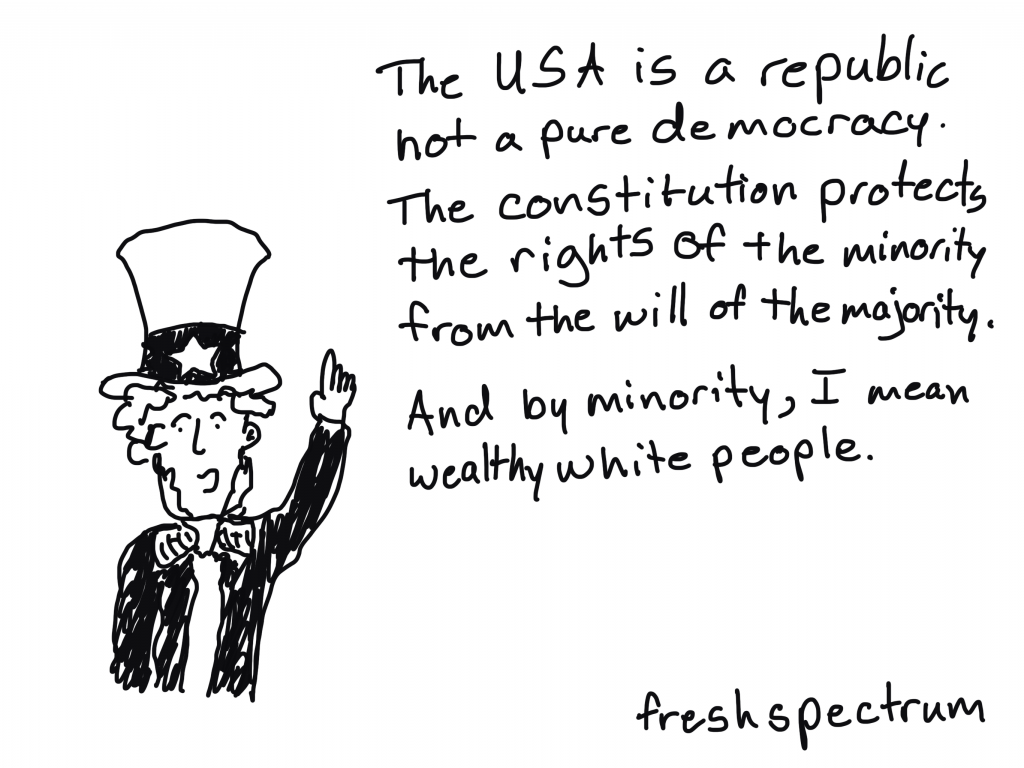
The United States, like most modern nations, is neither a pure republic nor a pure democracy. Instead, it is a hybrid democratic republic.
The popular vote doesn’t elect the president and vice president. Instead the election is the result of voting by the electoral college. This how Trump won in 2016 even though he did not win the popular vote.
The powers given to southern slave states during the founding of the US continue to reverberate.
Altogether, the three-fifths compromise had a detrimental impact on vulnerable populations, such as the enslaved and the nation’s Indigenous peoples. Slavery may have been kept in check rather than allowed to spread without it, and fewer Native Americans may have had their way of life upended, to tragic results, by removal policies. The three-fifths compromise allowed the states to unite, but the price was harmful government policies that continued to reverberate for generations.
The uneven representation within our political system has existed since the dawn of our democracy. Even as men and women were treated as though they were not men and women, southern representatives were fighting for enslaved people to be “counted” in the formulas that established political power.
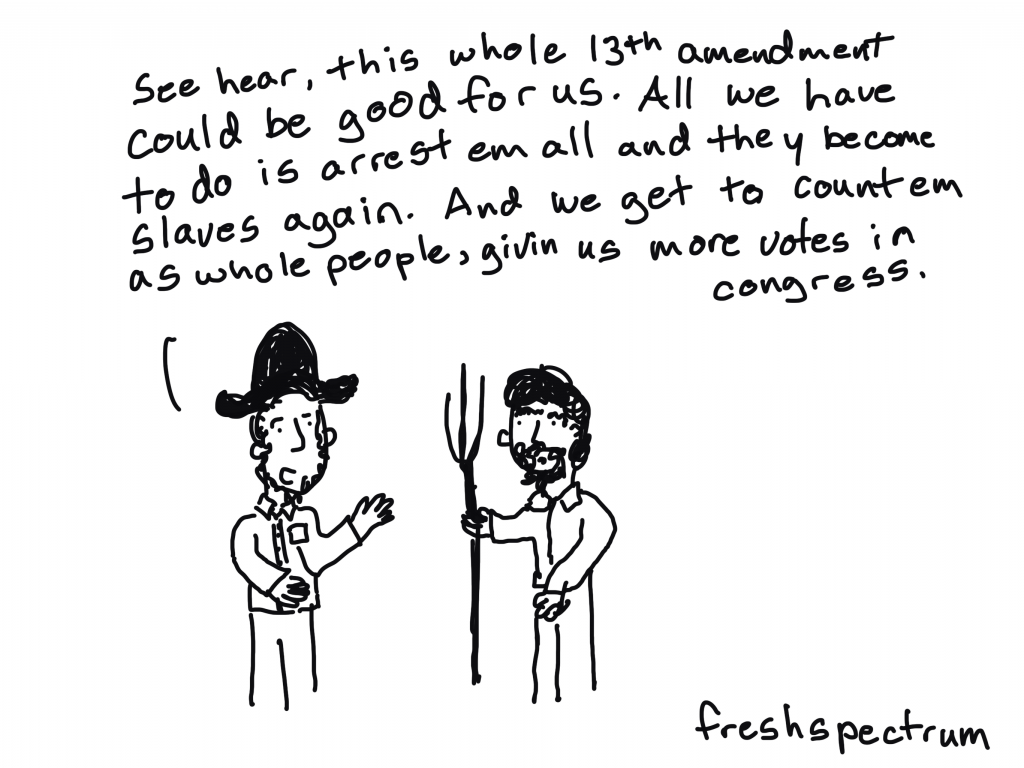
This unequal political power continued well after the fall of slavery.
Even the 13th Amendment, written to end slavery, gave enough wiggle room for southern states to suppress the votes of black southerners (or re-enslave through the prison system) while accumulating additional representational power in congress.
Section 1. Neither slavery nor involuntary servitude, except as a punishment for crime whereof the party shall have been duly convicted, shall exist within the United States, or any place subject to their jurisdiction.
All 50 states in the US were established prior to the Voting Rights Act of 1965.
All but 2 states (Alaska and Hawaii) were established prior to the 19th Amendment in 1920, which gave women the right to vote (white women).
Each state is given 2 senators. And the senate holds a lot of power, including the power to confirm Supreme Court nominees.
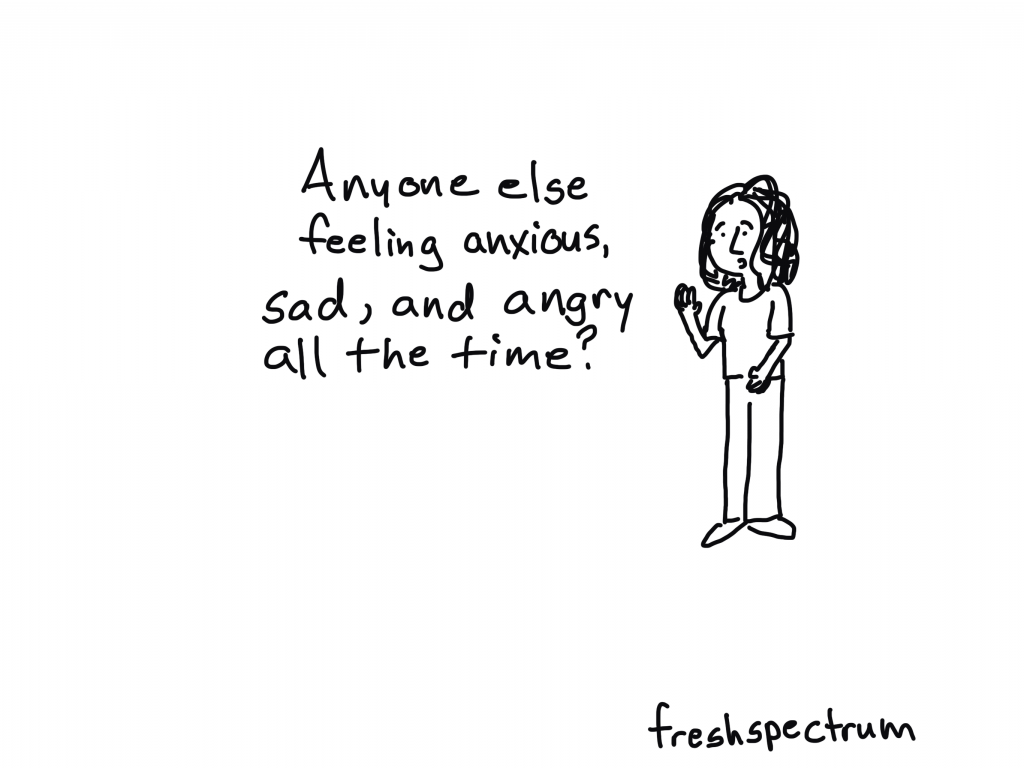
Washington DC is home to approximately 700,000, and the majority group in the district is black. Washington DC is not a state, and has no voting members in the US Senate.
Wyoming is home to approximately 600,000, and the majority group is overwhelmingly white. Wyoming is a state (it become one in 1890). It has 2 voting members in the US Senate.
These states were created as the country broke treaty after treaty with the indigenous peoples who’s ancestors lived on this land long before the first colonists.
Interested in diving deeper into US history?
One book I would recommend is Paul Ortiz’ An African American and Latinx History of the United States.
Spanning more than two hundred years, An African American and Latinx History of the United States is a revolutionary, politically charged narrative history, arguing that the “Global South” was crucial to the development of America as we know it. Scholar and activist Paul Ortiz challenges the notion of westward progress as exalted by widely taught formulations like “manifest destiny” and “Jacksonian democracy,” and shows how placing African American, Latinx, and Indigenous voices unapologetically front and center transforms US history into one of the working class organizing against imperialism.
An African American and Latinx History of the United States.
Why you see lines at polling stations.
I live in North Carolina, which is a purple state.
We have a governor who is a democrat, two republican senators, and a state legislature full of republicans.
Mail in voting here was not exactly easy, but it wasn’t impossible. We didn’t have to make an excuse, just request a ballot. And we had to have a witness sign our envelope before putting our ballots in the mail.
Friends in Maryland seem to have it easier. But some friends in the deeper south definitely do not.
I’ve written so far about just some of the history behind our country. Making it hard for some people to vote in order to gain an unfair advantage is simply an American tradition.
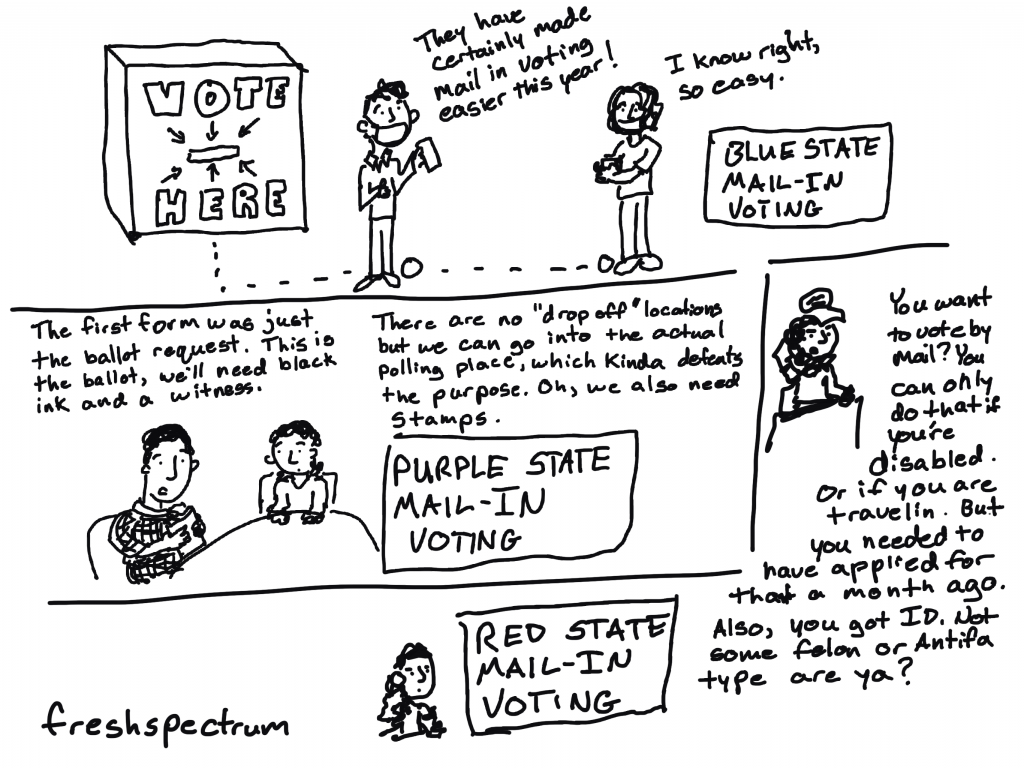
The United States is a Deeply Segregated Country
The United States is on track to be a majority-minority nation by 2044. But census data show most of our neighbors are the same race.
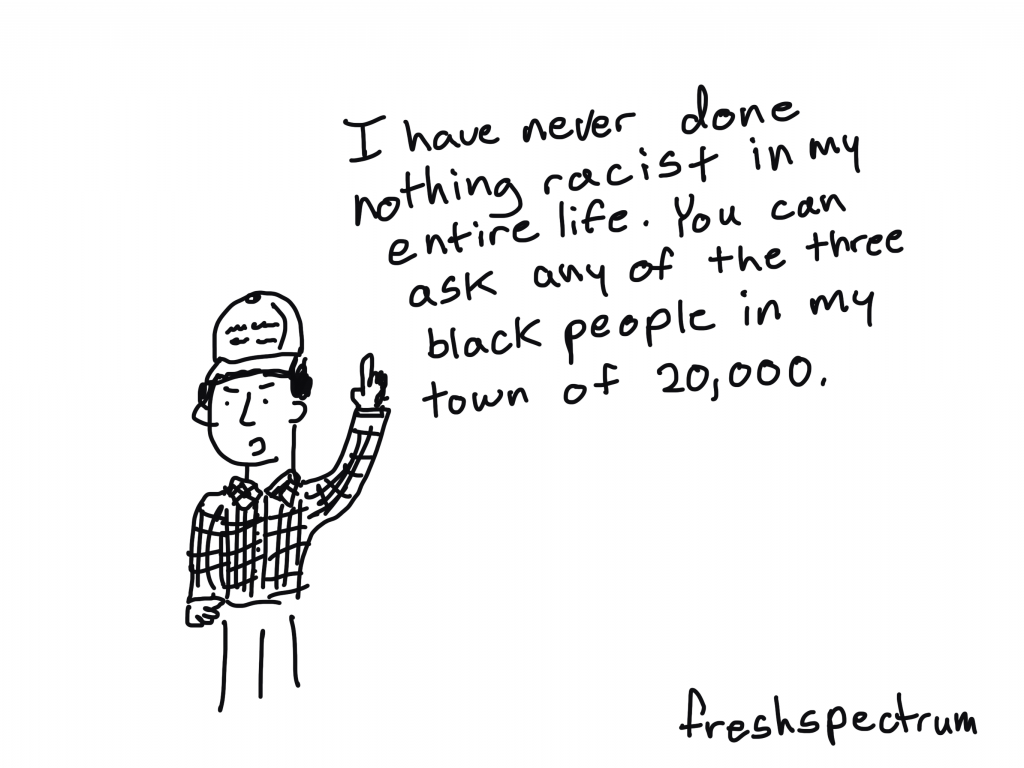
The US is know for its wide open spaces. And if you’ve ever had the opportunity to drive across this country, you’ve seen them. Where we live, and the people who surround us, shape our lives in so many ways.
I grew up in a red pocket of a blue state. It was a segregated (white majority) exurb about a half hour west of Baltimore. Many of the people where I grew up are now Trump supporters.
The vast majority would never consider themselves racist, even the ones who support overtly racist policies and laugh at horrible racist jokes/memes.
Living connected but very different lives
Neither racism nor segregation is just a southern thing in the US. Racism has had a huge impact in this country, north and south. And the north’s racist history has also shaped politics.
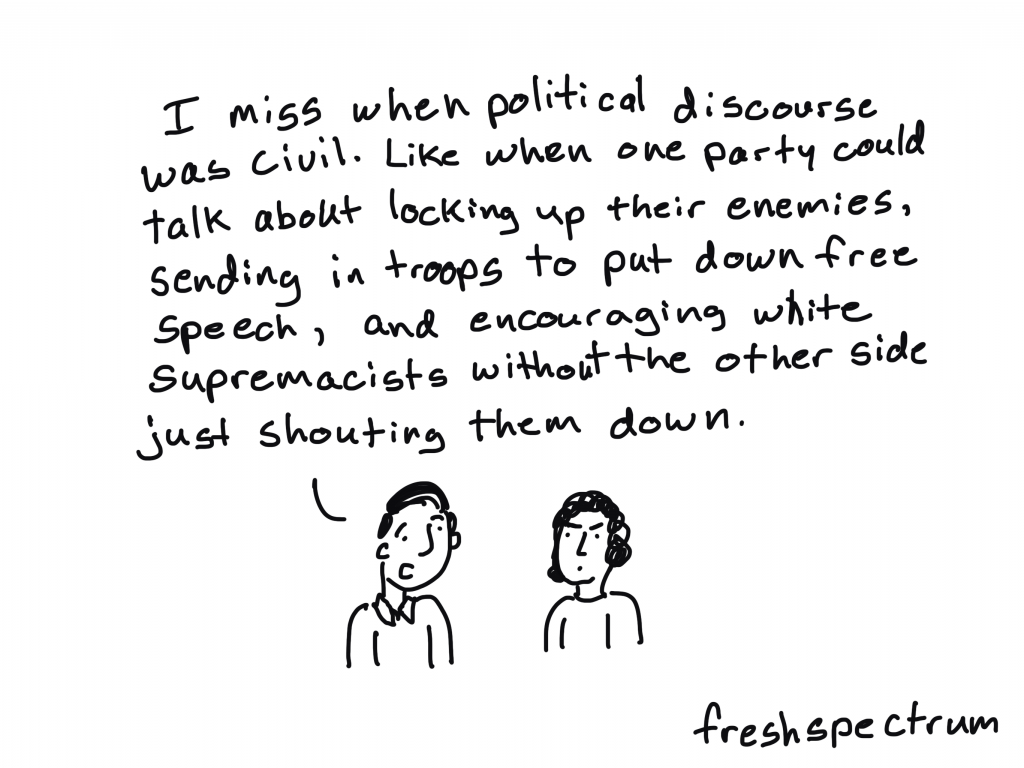
But in Vienna, as in hundreds of mostly white towns with similar histories across America, much is left unspoken. Around here, almost no one talks openly about the violence that drove out Black residents nearly 70 years ago, or even whispers the name these places were given: “sundown towns.”
Unless they’re among the handful of Black residents.
“It’s real strange and weird out here sometimes,” said Nicholas Lewis, a stay-at-home father. “Every time I walk around, eyes are on me.”
Building paranoia and fanning the flames
Popular right wing bloggers are doing their best to spread misinformation. And considering our internal disconnects from people who don’t think like us, and social media’s echo chamber creating algorithms, this misinformation is boosting dangerous rhetoric.
It’s a little too easy to draw parallels between current events and the McCarthy era red scare.

The far right has been shown to pose a far greater danger, so why are so many Americans afraid of anti-fascists?
Whether COVID or ANTIFA, the president and his political allies are boosting the lies.
Politics have always come with a bit of “spin.”
But what the president has been doing consistently is not spin. It’s just plain lies. Lies that ramp up his base and trigger extreme actions.
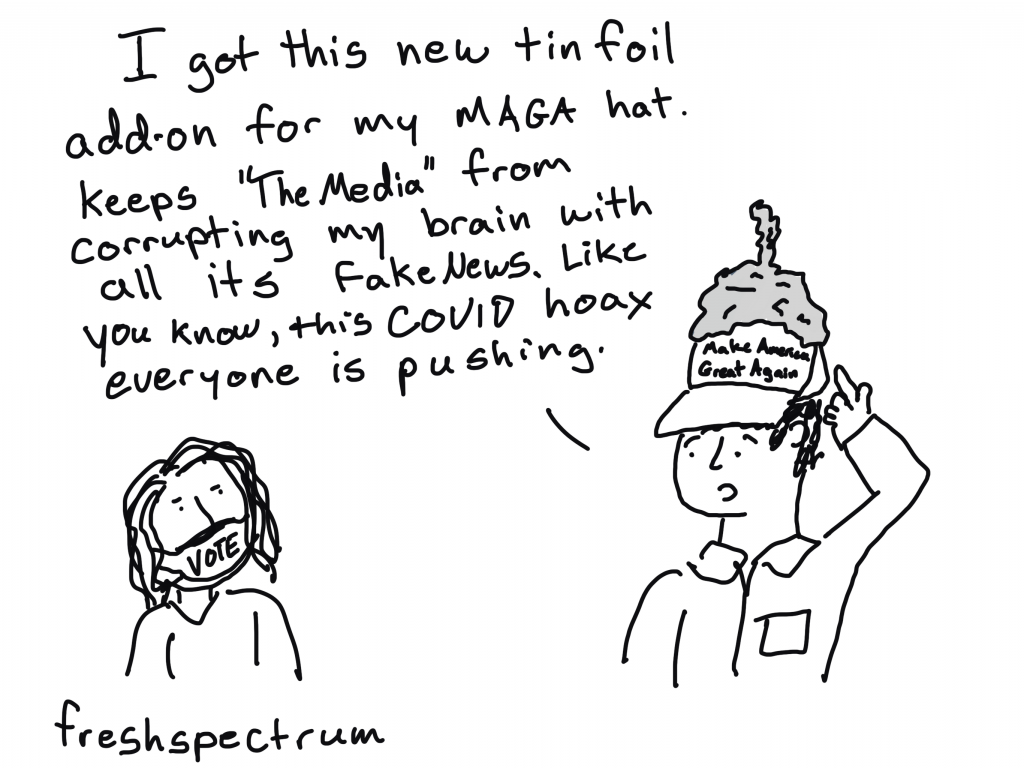
President Trump, who announced overnight that he and first lady Melania Trump have tested positive for the coronavirus, has repeatedly downplayed the severity of the coronavirus pandemic and often contradicted public health experts and members of his own administration in their more grave warnings about the virus.
They believe they are patriots
White supremacy and far-right terrorist groups have a supporter in the highest office in the country. When white guys wearing camouflage and holding assault rifle show up at polling places, they believe they are doing what’s right.

Even after the FBI disrupted an alleged terrorist plot to kidnap Michigan Governor Gretchen Whitmer, the president keeps fanning the flames of violence.
Oh, and we are still a country run mostly by white men.
You’ll likely see a bunch of rhetoric tying Kamala Harris to socialism in a way that won’t be done for Biden. And the language used to talk about Harris is horrible. I mean just a week ago Trump called Harris a Monster.
But as extreme as Trump can be, I think the insidious nature of misogyny in this country was more on display during the presidential debate. And then in discussions following the debate, which quickly shifted away from the constant manterruptions to the fly that landed on Pence’s head.
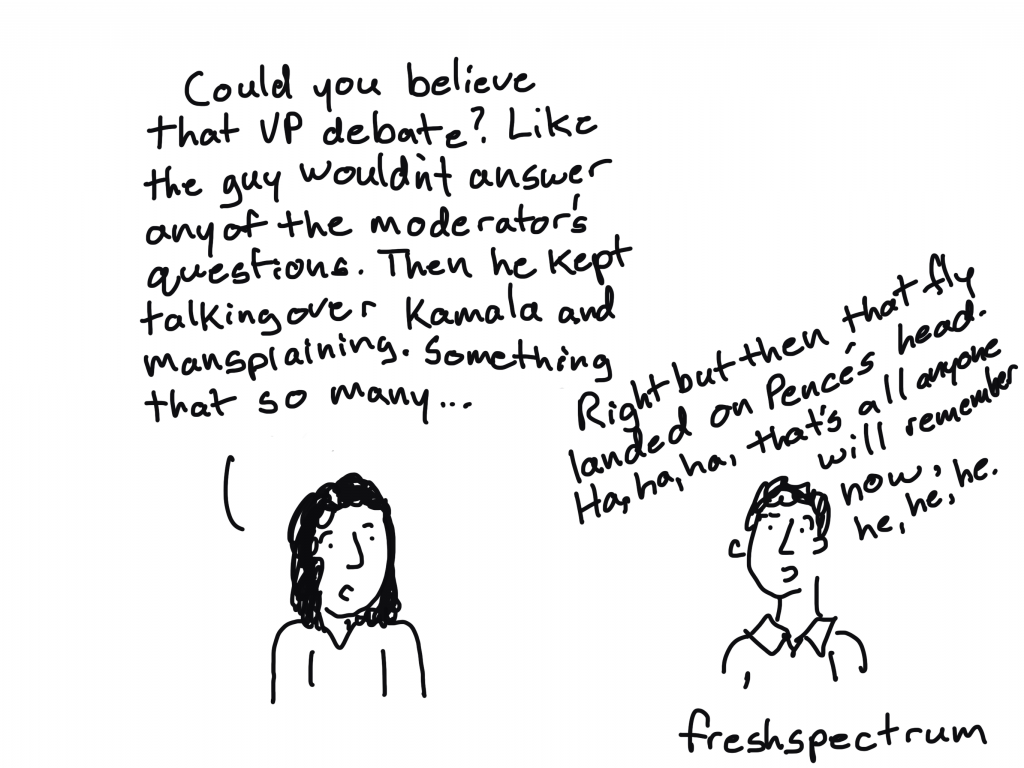
Yes, there was a fly on Vice President Mike Pence’s head during this week’s vice presidential debate. But before the insect stole the show, social media was already abuzz with comments about Pence’s multiple interruptions of his opponent, Senator Kamala Harris, and his refusal to stop talking when moderator Susan Page called time.
Page signaled to Harris to stop talking 13 times. She had to signal Pence 45 times.
Vote
If you are in the US and reading this, please vote. Even if it’s hard. Even if it doesn’t seem like it will matter in your state. Please vote.
If you have family or friends in the US that you can encourage to vote. Please do. Don’t assume that everyone votes, because they don’t.
This election needs to be a referendum on how this country should be governed. And while I am not happy that this is an election between two old white guys, I do know that one is far better equipped to lead this country.